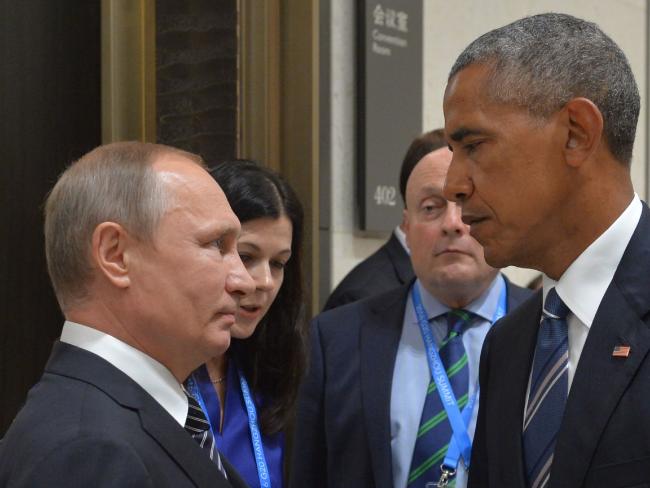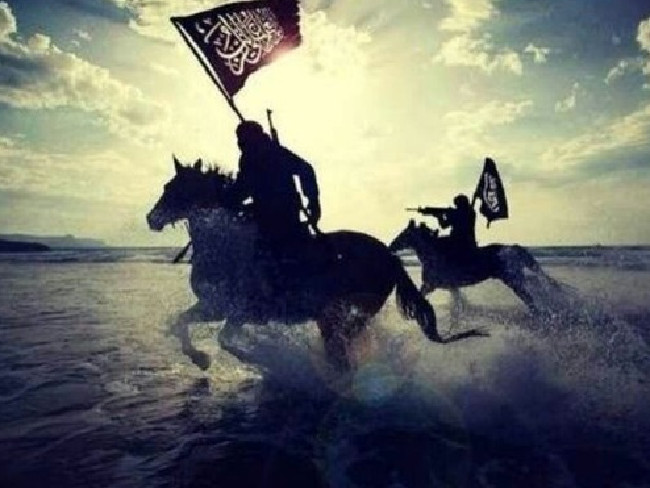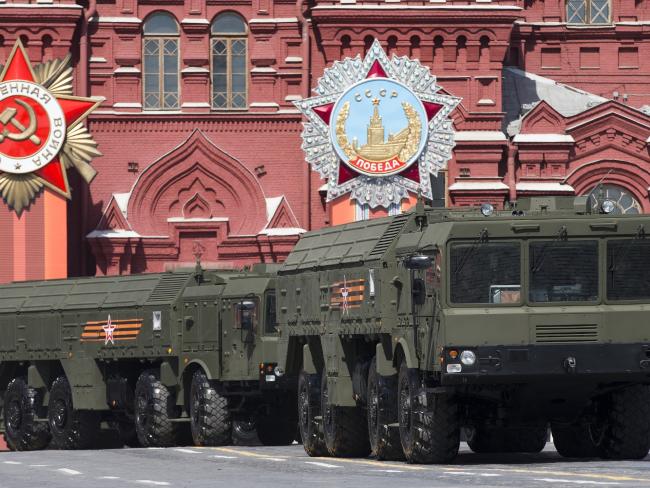
Russian President Vladimir Putin reportedly called for his countrymen to return home. Picture: Ivan Sekretarev
SUPERPOWERS clashing, tensions mounting in global hot spots, and a call for Russians to return home.
Terror attacks and domestic issues are fuelling distrust and fears that the world is on the brink of World War III are growing by the day.
While the world is no doubt a dangerous place at the moment, how worried should we really be about war breaking out on a global scale?
University of New South Wales (Canberra) Professor Greg Austin said we have every reason to be alarmed with rising tensions across the Middle East, the Korean peninsula and the Ukraine.
Prof Austin, who has a 30-year career in international security affairs, said it was fair to say there were worrying signs of conflict everywhere.
However, the Professorial Fellow with the EastWest Institute (EWI) in New York, said the prospect of a large scale military conflict taking place was certainly some way off.
Prof Austin said the world was seeing definite signs of militarisation particularly in regards to Russia and China.
“There may be a new Cold War but not in the same way as the first,” he said.
“Russia and china are co-operating over the Korean peninsula but the bad sign here is they are doing a Trump by trying to make things great again.
“That feeling of being victims is undermining this picture.”

Russian President Vladimir Putin pictured with US counterpart Barack Obama on the sidelines of the G20 Leaders Summit in Hangzhou last month, Picture: Alexei Druzhinin/AFPSource:AFP
Prof Austin said Iraq and Syria was also a major flashpoint between the world powers and no one was surprised when Russia sided with the Syrian government in the conflict.
He said the other concern was Turkey’s involvement in northern Syria and Iraq with President Recep Tayyip Erdogan pursuing an irrational and conspiratorial agenda.
“The other big concern is Ukraine, which even though the stand-off is stable, Russia remains intent on punishing its government,” he said.
Prof Austin said fears of increasing conflict taking place were fuelled by terrorist attacks in western Europe and in the case of the US, police shootings.
He argued while most of these issues were far from Australia, our government could be playing a lot bigger role in helping to ease the world’s tensions.
“Successive Labor governments for example did this like [former foreign minister] Gareth Evans did during the Cambodian conflict,” he said.
“Our current foreign minister however doesn’t seem as concerned with the world’s problems.”
‘COLD WAR TWO’
Writing in the Independent’s Voices section, Deputy Managing Editor Sean O’Grady argues the world is facing a dangerous and potentially devastating second Cold War.
“At the risk of sounding a little foolish, there is, sadly, much evidence that World War Three has already arrived, though not quite in the way so many futurologists of the past imagined it, as a clash between superpowers, their tanks chasing each other across the North German plain,” he writes.

Islamic State has yet to be defeated and maintains a deadly presence in the Middle East.Source:Supplied
O’Grady goes on to say that the planet is more kaleidoscopic and asymmetric in its violence and the reality is it’s pretty much up in flames already.
“The question is whether all the present (relatively) little wars could actually mutate into, or trigger, a real superpower conflict involving the US, Russia and China, at the least,” he writes.
O’Grady said the bigger concern other than a hot WW3 was a second Cold War, which would mean terror groups like Islamic State can never be defeated.
“The Second Cold War will most likely take on that sort of character, as it is already, but in more places, with more deadly weapons, more terrorism, a greater death toll, less respect for national borders and, thus, with more dangers of escalation attached,” he writes.
‘MORE LIKE A COLD PEACE’
Brisbane-based observer of international relations Nikolay Murashkin told news.com.au that he believed the use of “cold war” as a metaphor was really all about a feeling of global uncertainty and our inability to grasp it or make sense of it.
However the doctoral candidate at the University of Cambridge and an associate member of RMIT University’s Centre for Global Research questioned whether history actually ever repeats itself.
“There are certainly heightening tensions between the US and Russia in Syria and bilaterally, but the situation is very different from historic Cold War, structurally different,” he said.
“At present, it is not a competition between two alternative political, economic and ideological systems with rival worldviews and hub-and-spoke alliance systems.”
He said while there does appear to be a kind of brinkmanship to a certain extent, as we are seeing it between the US and Russia over Syria, it is not a global-scale standoff that would allow it to qualify it as a “world war”.

Many experts agree Russia is becoming more militaristic. Picture: Alexander ZemlianichenkoSource:AP
“It is a matter of great power intervention in other countries and reaction to it from other powers,” he said.
“The context of the US election makes this uncertainty appear more acute and mediatised. I would characterise the situation as cold peace.”
PUTIN ORDERS RUSSIANS HOME: REPORT
It remains clear global uncertainty and tensions remain high with the west paying particular attention to Russia.
Reports surfaced just days ago that the Russian leader reportedly told officials to fly relatives living abroad back to Russia.
The call extended to elderly relatives overseas and children, even if they are in the middle of the school year, raising concerns over the urgent call back to the fatherland.
Russian political analyst Stanislav Belkovsky told The Daily Star it was part of the package of measures to prepare elites to some “big war.”
It comes as more than 40 million Russians took part in three days of extensive drills to prepare for a nuclear or natural disaster earlier this month.
However Russian officials claim the report is greatly exaggerated and dismissed it as scare mongering.
EXTENDING MILITARY REACH
There’s no doubt Russia is also extending its military reach.
Strategic forecasting and global intelligence company Statfor, Russia is reportedly considering restoring Soviet-era bases in Egypt, Vietnam and Cuba.
Its latest Geopolitical Diary blog said Russia’s intentions remained fairly clear.
“When locked in a multi-theatre confrontation with the United States, what better way for the Russian bear to trample the US security umbrella than with a growing military footprint?”

Chinese Navy personnel aboard the FFG Xiangtan this month. China has a strong interest in keeping the Korean peninsula stable. Picture: Romeo GacadSource:AFP
‘WORLD REACHES DANGEROUS POINT’
The comments and speculation surrounding global conflict come as the relationship between the US and Russia reaches a low-point described as a much more “dangerous and unpredictable situation” than the Cold War by a former director of the US MacArthur Foundation.
The former enemies have clashed recently over a range of issues from leaked emails in the US election to Syria and responsibility for shooting down passenger plane MH17.
On Thursday, Russian Foreign Ministry spokeswoman Maria Zakharova warned the US is again pursuing a “dangerous” “scorched earth” policy in the final months of Obama’s Presidency.
“Nobody should harbour the illusion that you can pressure Russia, neither the current American authorities nor those who will replace them,” she said.
The US government has also formally accused Russia of launching a hacking campaign to “interfere with the US election process” after large tracts of Democratic Party emails were leaked that have damaged Hillary Clinton’s campaign. Putin has denied any involvement.
The drastic escalation in tensions led the Soviet Union’s last leader Mikhail Gorbachev to speak out, saying “I think the world has reached a dangerous point.”
“This needs to stop. We need to renew dialogue,” he told AFP in a month that has seen the Russian leader cancel a trip to France and pull out of a treaty signed in 2000 with then US President Bill Clinton to dispose of excess material that could be used to make nuclear weapons.
The situation in Syria is also an intractable point in the standoff.
A ceasefire between the US-backed rebel forces and Russian-backed regime recently collapsed and has led to a crisis in the city of Aleppo that the mayor has referred to as a “holocaust.”
This weekend, efforts to renew a truce in Syria will continue as Russia’s foreign minister Sergey Lavrov meets with US foreign minister John Kerry in Switzerland.
CLASHING POINT
But there’s also another unlikely flashpoint in all of this and it comes in the form of a tiny nation state.
The former Yugoslav nation of Montenegro has found itself caught up in the ideological battle taking place between the east and west.
Montenegro, which goes to the polls this weekend, faces a choice of continuing on a chartered pro-Western course and NATO membership, or sliding back to traditional ally Russia.
According to Associated Press, the outcome of the vote could jeopardise NATO and European Union enlargement in southeastern Europe and could prove decisive in Moscow’s bid to regain influence in the strategic region.
But the nation of 650,000 people remains divided among those who favour and oppose the Western integration.
Russia strongly opposes the expansion of the Western military alliance in European ex-communist countries it considers part of its “strategic interests.”
However wary of Russian influence in the still-volatile region, which was engulfed in bloody civil wars in the 1990s, the West wants Montenegro in NATO.
— with AP







